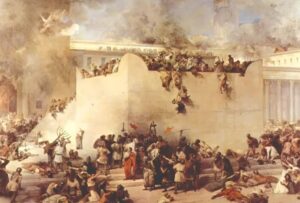Lamentations’ End

 Eikha’s penultimate verse “Hashiveinu Hashem Elekha,” read and repeated tonight as we mark Tisha B’Av, is an unambiguously hopeful plea requesting God to return to us as in days of old. The verse is repeated at the conclusion of the reading to end on a hopeful note, and has found its way into our year-round prayers and the “songbook” of countless kumzitzes. The actual final verse of Lamentations is difficult to understand, and has been interpreted in three different ways by Hazal. These divergent understandings have distinct implications with regard to the theological meaning of Hurban, and subtly respond in different ways to Christian arguments equating Jerusalem’s destruction with the purported rejection of the Jewish People by God and Christian “supersessionist” claims.
Eikha’s penultimate verse “Hashiveinu Hashem Elekha,” read and repeated tonight as we mark Tisha B’Av, is an unambiguously hopeful plea requesting God to return to us as in days of old. The verse is repeated at the conclusion of the reading to end on a hopeful note, and has found its way into our year-round prayers and the “songbook” of countless kumzitzes. The actual final verse of Lamentations is difficult to understand, and has been interpreted in three different ways by Hazal. These divergent understandings have distinct implications with regard to the theological meaning of Hurban, and subtly respond in different ways to Christian arguments equating Jerusalem’s destruction with the purported rejection of the Jewish People by God and Christian “supersessionist” claims.
In “Does Lamentations’ End Justify Its Means?” (from TRADITION’s Winter 2023 issue) Aton M. Holzer explores the approaches and argues that the liturgy and customs of Tisha B’Av embrace one particular reading, one which sees excessive Divine rage as a manifestation of continued interest in and engagement with the Jewish people. This renders Tisha B’Av a mo’ed, a day of Divine encounter, and the day’s mourning practices enclose, at its core, a manifestation of God’s love.
Rabbi Dr. Aton Holzer is the Director of the Mohs Surgery Clinic in the Department of Dermatology, Tel Aviv-Sourasky Medical Center.
